CQU SET Indigenous Cultural Awareness Training Project Plan Term 2
VerifiedAdded on 2023/06/05
|13
|2535
|102
Project
AI Summary
This project plan outlines the development of an indigenous cultural awareness training program for the School of Engineering and Technology (SET) at CQU, aiming to promote understanding of indigenous culture among students and staff. Key components include stakeholder engagement, requirements management, scope definition using a work breakdown structure (WBS), schedule development, cost baseline establishment, risk assessment, tolerance levels, and lessons learned from previous training initiatives. The project seeks to align with NAIDOC week 2019 and incorporate indigenous history, culture, language, and protocols into both online and face-to-face training modules, tailored to meet the needs of university students and employees. The plan emphasizes the importance of expert judgment, requirements prioritization using the MoSCoW technique, and effective communication strategies to ensure the project's success.
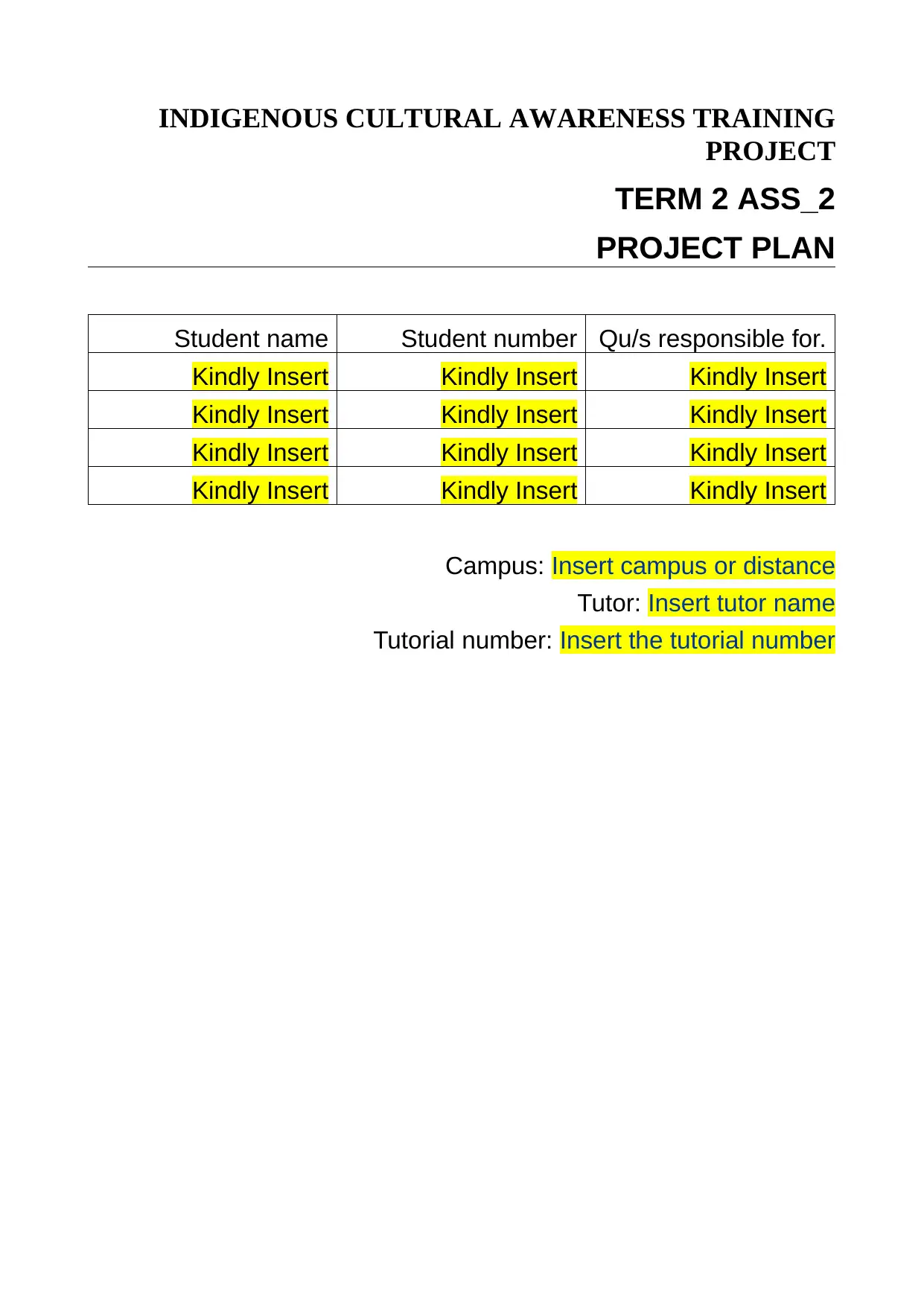
INDIGENOUS CULTURAL AWARENESS TRAINING
PROJECT
TERM 2 ASS_2
PROJECT PLAN
Student name Student number Qu/s responsible for.
Kindly Insert Kindly Insert Kindly Insert
Kindly Insert Kindly Insert Kindly Insert
Kindly Insert Kindly Insert Kindly Insert
Kindly Insert Kindly Insert Kindly Insert
Campus: Insert campus or distance
Tutor: Insert tutor name
Tutorial number: Insert the tutorial number
PROJECT
TERM 2 ASS_2
PROJECT PLAN
Student name Student number Qu/s responsible for.
Kindly Insert Kindly Insert Kindly Insert
Kindly Insert Kindly Insert Kindly Insert
Kindly Insert Kindly Insert Kindly Insert
Kindly Insert Kindly Insert Kindly Insert
Campus: Insert campus or distance
Tutor: Insert tutor name
Tutorial number: Insert the tutorial number
Paraphrase This Document
Need a fresh take? Get an instant paraphrase of this document with our AI Paraphraser
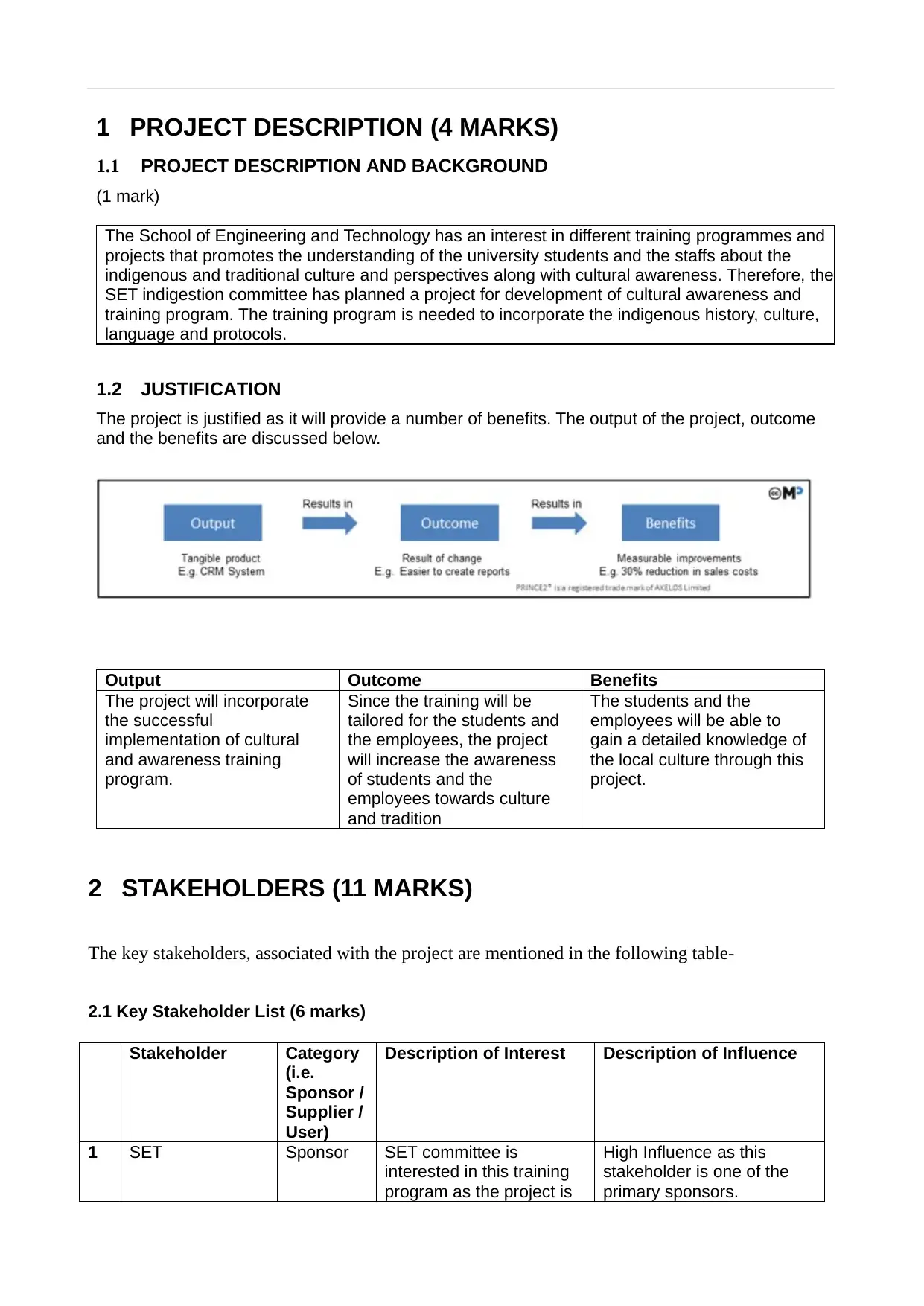
1 PROJECT DESCRIPTION (4 MARKS)
1.1 PROJECT DESCRIPTION AND BACKGROUND
(1 mark)
The School of Engineering and Technology has an interest in different training programmes and
projects that promotes the understanding of the university students and the staffs about the
indigenous and traditional culture and perspectives along with cultural awareness. Therefore, the
SET indigestion committee has planned a project for development of cultural awareness and
training program. The training program is needed to incorporate the indigenous history, culture,
language and protocols.
1.2 JUSTIFICATION
The project is justified as it will provide a number of benefits. The output of the project, outcome
and the benefits are discussed below.
Output Outcome Benefits
The project will incorporate
the successful
implementation of cultural
and awareness training
program.
Since the training will be
tailored for the students and
the employees, the project
will increase the awareness
of students and the
employees towards culture
and tradition
The students and the
employees will be able to
gain a detailed knowledge of
the local culture through this
project.
2 STAKEHOLDERS (11 MARKS)
The key stakeholders, associated with the project are mentioned in the following table-
2.1 Key Stakeholder List (6 marks)
Stakeholder Category
(i.e.
Sponsor /
Supplier /
User)
Description of Interest Description of Influence
1 SET Sponsor SET committee is
interested in this training
program as the project is
High Influence as this
stakeholder is one of the
primary sponsors.
1.1 PROJECT DESCRIPTION AND BACKGROUND
(1 mark)
The School of Engineering and Technology has an interest in different training programmes and
projects that promotes the understanding of the university students and the staffs about the
indigenous and traditional culture and perspectives along with cultural awareness. Therefore, the
SET indigestion committee has planned a project for development of cultural awareness and
training program. The training program is needed to incorporate the indigenous history, culture,
language and protocols.
1.2 JUSTIFICATION
The project is justified as it will provide a number of benefits. The output of the project, outcome
and the benefits are discussed below.
Output Outcome Benefits
The project will incorporate
the successful
implementation of cultural
and awareness training
program.
Since the training will be
tailored for the students and
the employees, the project
will increase the awareness
of students and the
employees towards culture
and tradition
The students and the
employees will be able to
gain a detailed knowledge of
the local culture through this
project.
2 STAKEHOLDERS (11 MARKS)
The key stakeholders, associated with the project are mentioned in the following table-
2.1 Key Stakeholder List (6 marks)
Stakeholder Category
(i.e.
Sponsor /
Supplier /
User)
Description of Interest Description of Influence
1 SET Sponsor SET committee is
interested in this training
program as the project is
High Influence as this
stakeholder is one of the
primary sponsors.
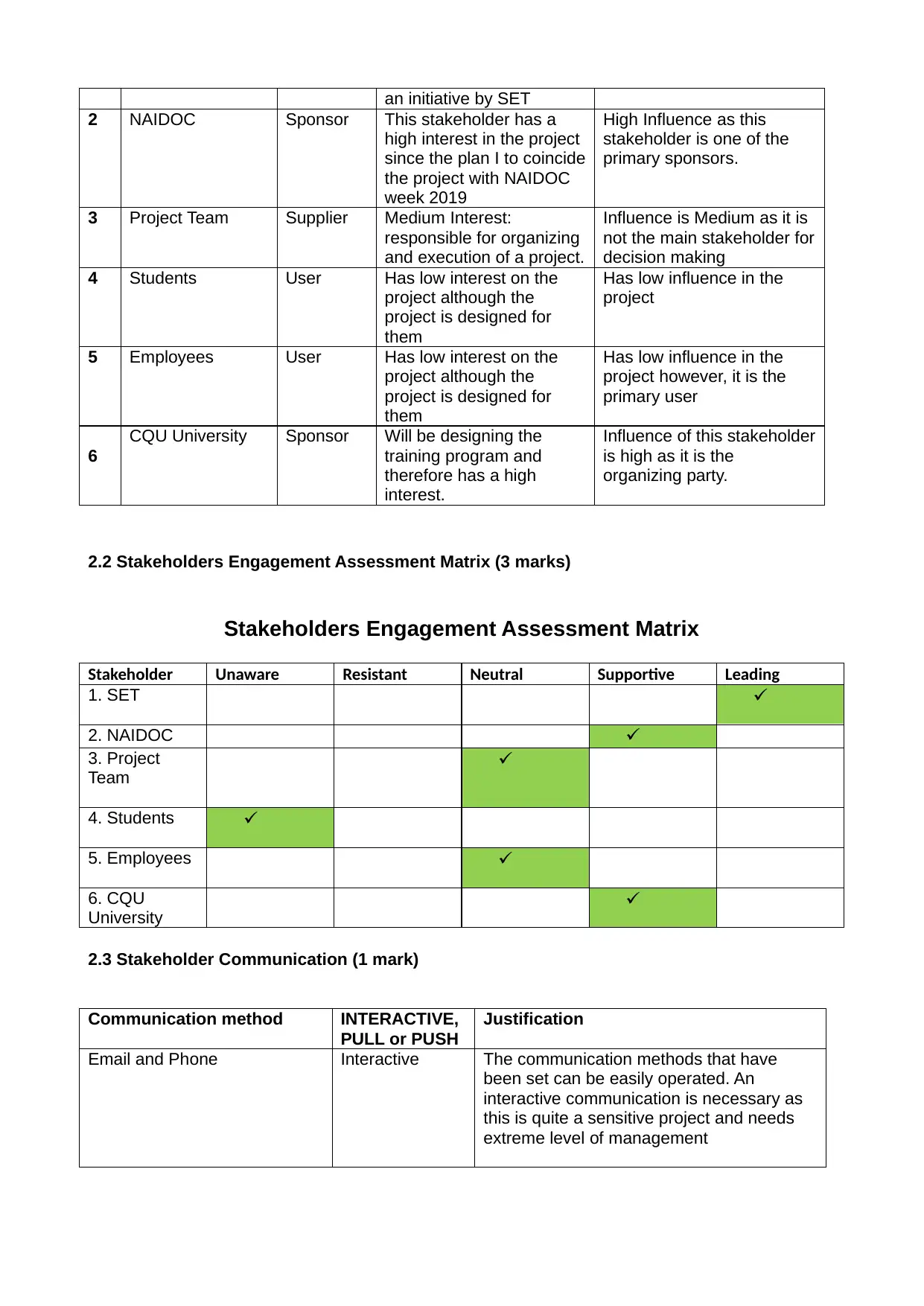
an initiative by SET
2 NAIDOC Sponsor This stakeholder has a
high interest in the project
since the plan I to coincide
the project with NAIDOC
week 2019
High Influence as this
stakeholder is one of the
primary sponsors.
3 Project Team Supplier Medium Interest:
responsible for organizing
and execution of a project.
Influence is Medium as it is
not the main stakeholder for
decision making
4 Students User Has low interest on the
project although the
project is designed for
them
Has low influence in the
project
5 Employees User Has low interest on the
project although the
project is designed for
them
Has low influence in the
project however, it is the
primary user
6
CQU University Sponsor Will be designing the
training program and
therefore has a high
interest.
Influence of this stakeholder
is high as it is the
organizing party.
2.2 Stakeholders Engagement Assessment Matrix (3 marks)
Stakeholders Engagement Assessment Matrix
Stakeholder Unaware Resistant Neutral Supportive Leading
1. SET
2. NAIDOC
3. Project
Team
4. Students
5. Employees
6. CQU
University
2.3 Stakeholder Communication (1 mark)
Communication method INTERACTIVE,
PULL or PUSH
Justification
Email and Phone Interactive The communication methods that have
been set can be easily operated. An
interactive communication is necessary as
this is quite a sensitive project and needs
extreme level of management
2 NAIDOC Sponsor This stakeholder has a
high interest in the project
since the plan I to coincide
the project with NAIDOC
week 2019
High Influence as this
stakeholder is one of the
primary sponsors.
3 Project Team Supplier Medium Interest:
responsible for organizing
and execution of a project.
Influence is Medium as it is
not the main stakeholder for
decision making
4 Students User Has low interest on the
project although the
project is designed for
them
Has low influence in the
project
5 Employees User Has low interest on the
project although the
project is designed for
them
Has low influence in the
project however, it is the
primary user
6
CQU University Sponsor Will be designing the
training program and
therefore has a high
interest.
Influence of this stakeholder
is high as it is the
organizing party.
2.2 Stakeholders Engagement Assessment Matrix (3 marks)
Stakeholders Engagement Assessment Matrix
Stakeholder Unaware Resistant Neutral Supportive Leading
1. SET
2. NAIDOC
3. Project
Team
4. Students
5. Employees
6. CQU
University
2.3 Stakeholder Communication (1 mark)
Communication method INTERACTIVE,
PULL or PUSH
Justification
Email and Phone Interactive The communication methods that have
been set can be easily operated. An
interactive communication is necessary as
this is quite a sensitive project and needs
extreme level of management
⊘ This is a preview!⊘
Do you want full access?
Subscribe today to unlock all pages.

Trusted by 1+ million students worldwide
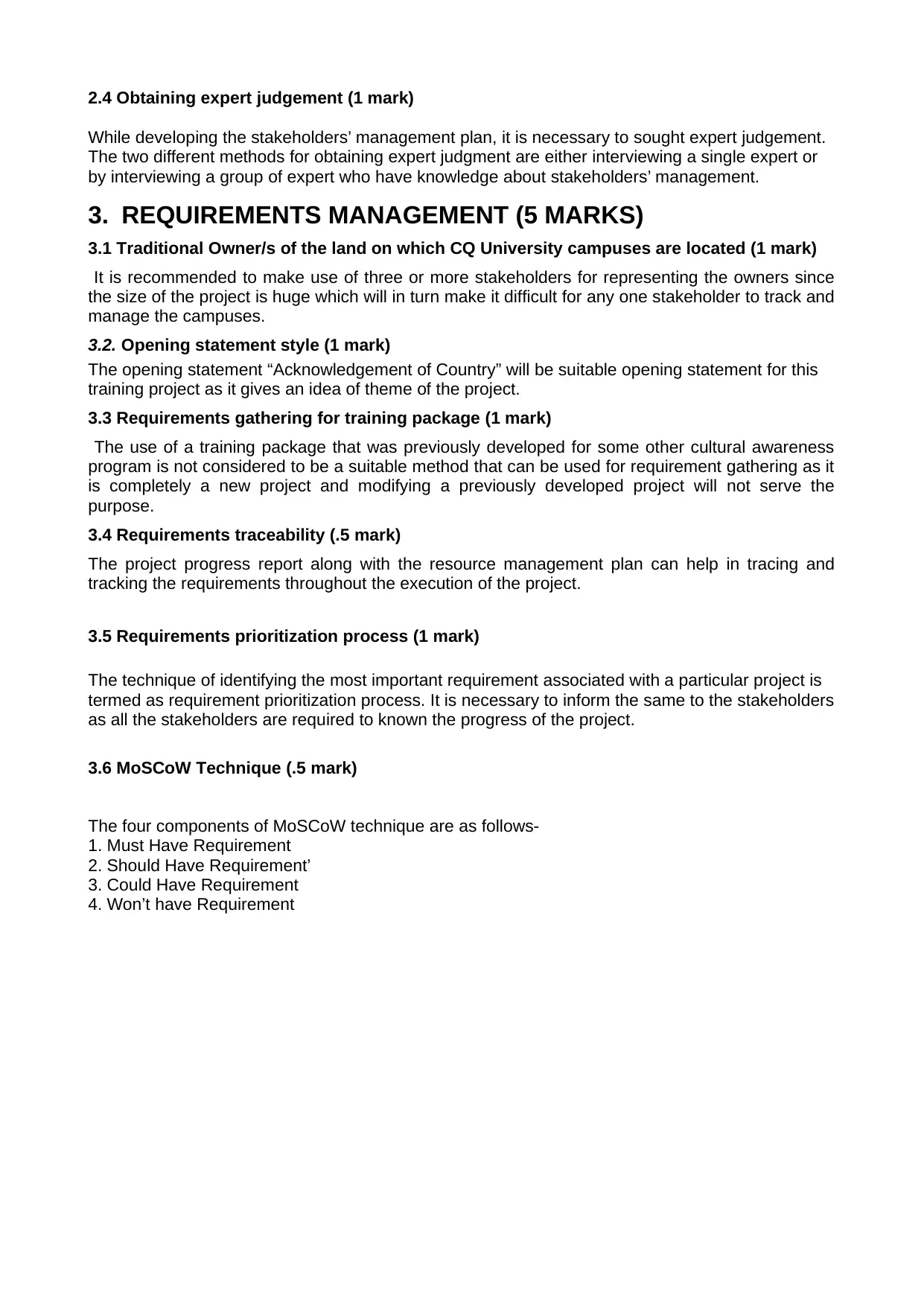
2.4 Obtaining expert judgement (1 mark)
While developing the stakeholders’ management plan, it is necessary to sought expert judgement.
The two different methods for obtaining expert judgment are either interviewing a single expert or
by interviewing a group of expert who have knowledge about stakeholders’ management.
3. REQUIREMENTS MANAGEMENT (5 MARKS)
3.1 Traditional Owner/s of the land on which CQ University campuses are located (1 mark)
It is recommended to make use of three or more stakeholders for representing the owners since
the size of the project is huge which will in turn make it difficult for any one stakeholder to track and
manage the campuses.
3.2. Opening statement style (1 mark)
The opening statement “Acknowledgement of Country” will be suitable opening statement for this
training project as it gives an idea of theme of the project.
3.3 Requirements gathering for training package (1 mark)
The use of a training package that was previously developed for some other cultural awareness
program is not considered to be a suitable method that can be used for requirement gathering as it
is completely a new project and modifying a previously developed project will not serve the
purpose.
3.4 Requirements traceability (.5 mark)
The project progress report along with the resource management plan can help in tracing and
tracking the requirements throughout the execution of the project.
3.5 Requirements prioritization process (1 mark)
The technique of identifying the most important requirement associated with a particular project is
termed as requirement prioritization process. It is necessary to inform the same to the stakeholders
as all the stakeholders are required to known the progress of the project.
3.6 MoSCoW Technique (.5 mark)
The four components of MoSCoW technique are as follows-
1. Must Have Requirement
2. Should Have Requirement’
3. Could Have Requirement
4. Won’t have Requirement
While developing the stakeholders’ management plan, it is necessary to sought expert judgement.
The two different methods for obtaining expert judgment are either interviewing a single expert or
by interviewing a group of expert who have knowledge about stakeholders’ management.
3. REQUIREMENTS MANAGEMENT (5 MARKS)
3.1 Traditional Owner/s of the land on which CQ University campuses are located (1 mark)
It is recommended to make use of three or more stakeholders for representing the owners since
the size of the project is huge which will in turn make it difficult for any one stakeholder to track and
manage the campuses.
3.2. Opening statement style (1 mark)
The opening statement “Acknowledgement of Country” will be suitable opening statement for this
training project as it gives an idea of theme of the project.
3.3 Requirements gathering for training package (1 mark)
The use of a training package that was previously developed for some other cultural awareness
program is not considered to be a suitable method that can be used for requirement gathering as it
is completely a new project and modifying a previously developed project will not serve the
purpose.
3.4 Requirements traceability (.5 mark)
The project progress report along with the resource management plan can help in tracing and
tracking the requirements throughout the execution of the project.
3.5 Requirements prioritization process (1 mark)
The technique of identifying the most important requirement associated with a particular project is
termed as requirement prioritization process. It is necessary to inform the same to the stakeholders
as all the stakeholders are required to known the progress of the project.
3.6 MoSCoW Technique (.5 mark)
The four components of MoSCoW technique are as follows-
1. Must Have Requirement
2. Should Have Requirement’
3. Could Have Requirement
4. Won’t have Requirement
Paraphrase This Document
Need a fresh take? Get an instant paraphrase of this document with our AI Paraphraser
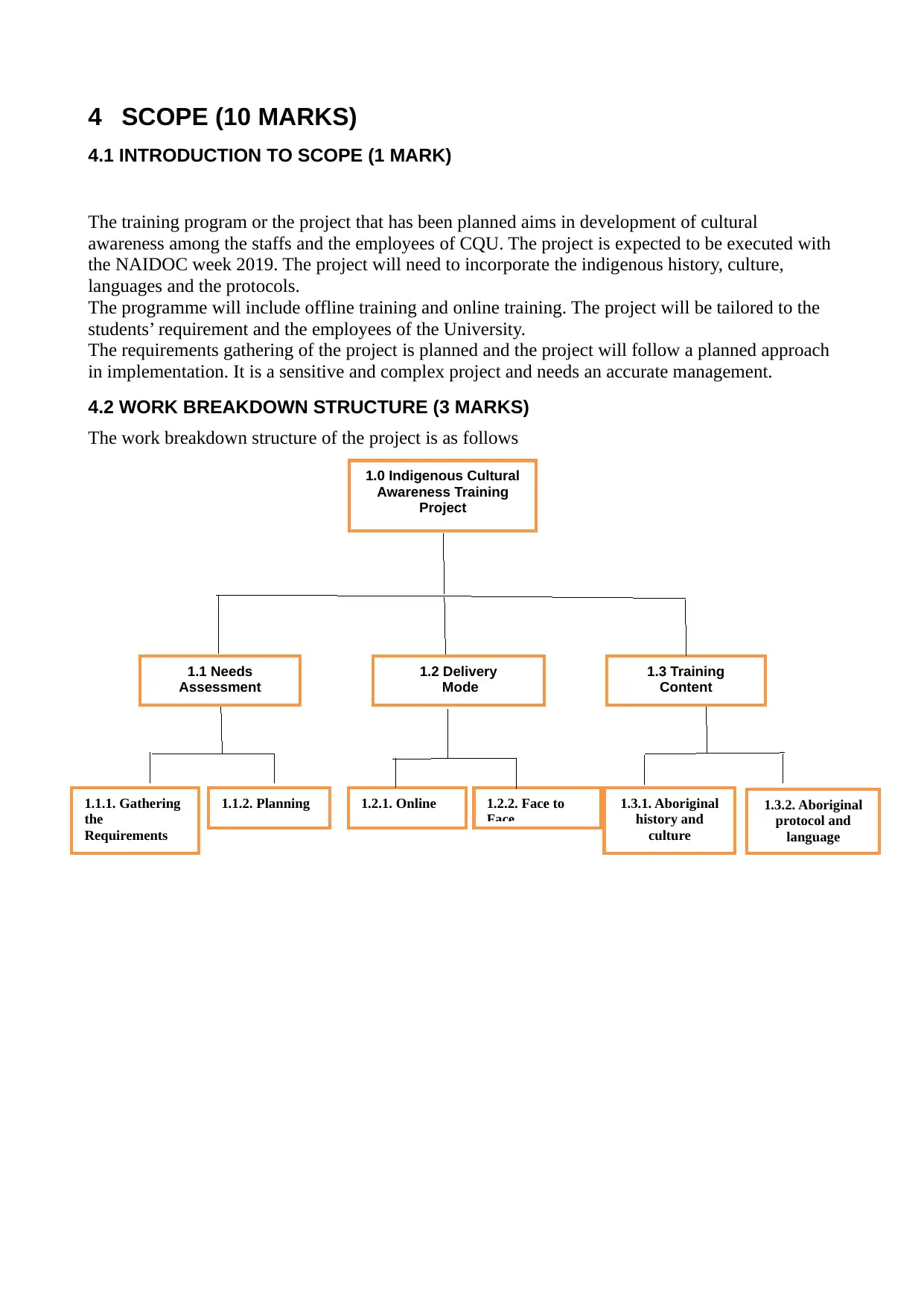
4 SCOPE (10 MARKS)
4.1 INTRODUCTION TO SCOPE (1 MARK)
The training program or the project that has been planned aims in development of cultural
awareness among the staffs and the employees of CQU. The project is expected to be executed with
the NAIDOC week 2019. The project will need to incorporate the indigenous history, culture,
languages and the protocols.
The programme will include offline training and online training. The project will be tailored to the
students’ requirement and the employees of the University.
The requirements gathering of the project is planned and the project will follow a planned approach
in implementation. It is a sensitive and complex project and needs an accurate management.
4.2 WORK BREAKDOWN STRUCTURE (3 MARKS)
The work breakdown structure of the project is as follows
1.0 Indigenous Cultural
Awareness Training
Project
1.3 Training
Content
1.2 Delivery
Mode
1.1 Needs
Assessment
1.3.2. Aboriginal
protocol and
language
1.3.1. Aboriginal
history and
culture
1.2.2. Face to
Face
1.2.1. Online1.1.2. Planning1.1.1. Gathering
the
Requirements
4.1 INTRODUCTION TO SCOPE (1 MARK)
The training program or the project that has been planned aims in development of cultural
awareness among the staffs and the employees of CQU. The project is expected to be executed with
the NAIDOC week 2019. The project will need to incorporate the indigenous history, culture,
languages and the protocols.
The programme will include offline training and online training. The project will be tailored to the
students’ requirement and the employees of the University.
The requirements gathering of the project is planned and the project will follow a planned approach
in implementation. It is a sensitive and complex project and needs an accurate management.
4.2 WORK BREAKDOWN STRUCTURE (3 MARKS)
The work breakdown structure of the project is as follows
1.0 Indigenous Cultural
Awareness Training
Project
1.3 Training
Content
1.2 Delivery
Mode
1.1 Needs
Assessment
1.3.2. Aboriginal
protocol and
language
1.3.1. Aboriginal
history and
culture
1.2.2. Face to
Face
1.2.1. Online1.1.2. Planning1.1.1. Gathering
the
Requirements
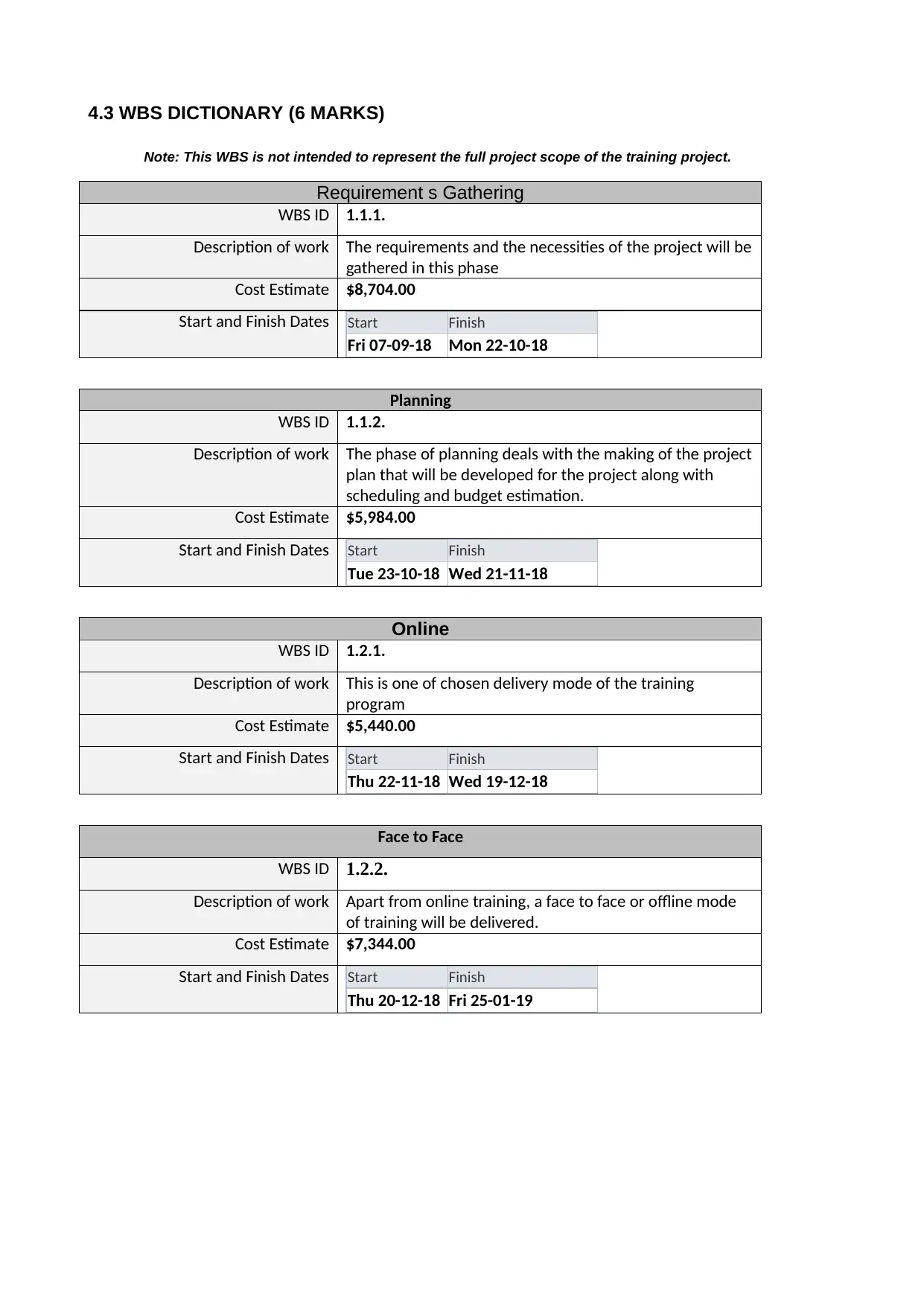
4.3 WBS DICTIONARY (6 MARKS)
Note: This WBS is not intended to represent the full project scope of the training project.
Requirement s Gathering
WBS ID 1.1.1.
Description of work The requirements and the necessities of the project will be
gathered in this phase
Cost Estimate $8,704.00
Start and Finish Dates Start Finish
Fri 07-09-18 Mon 22-10-18
Planning
WBS ID 1.1.2.
Description of work The phase of planning deals with the making of the project
plan that will be developed for the project along with
scheduling and budget estimation.
Cost Estimate $5,984.00
Start and Finish Dates Start Finish
Tue 23-10-18 Wed 21-11-18
Online
WBS ID 1.2.1.
Description of work This is one of chosen delivery mode of the training
program
Cost Estimate $5,440.00
Start and Finish Dates Start Finish
Thu 22-11-18 Wed 19-12-18
Face to Face
WBS ID 1.2.2.
Description of work Apart from online training, a face to face or offline mode
of training will be delivered.
Cost Estimate $7,344.00
Start and Finish Dates Start Finish
Thu 20-12-18 Fri 25-01-19
Note: This WBS is not intended to represent the full project scope of the training project.
Requirement s Gathering
WBS ID 1.1.1.
Description of work The requirements and the necessities of the project will be
gathered in this phase
Cost Estimate $8,704.00
Start and Finish Dates Start Finish
Fri 07-09-18 Mon 22-10-18
Planning
WBS ID 1.1.2.
Description of work The phase of planning deals with the making of the project
plan that will be developed for the project along with
scheduling and budget estimation.
Cost Estimate $5,984.00
Start and Finish Dates Start Finish
Tue 23-10-18 Wed 21-11-18
Online
WBS ID 1.2.1.
Description of work This is one of chosen delivery mode of the training
program
Cost Estimate $5,440.00
Start and Finish Dates Start Finish
Thu 22-11-18 Wed 19-12-18
Face to Face
WBS ID 1.2.2.
Description of work Apart from online training, a face to face or offline mode
of training will be delivered.
Cost Estimate $7,344.00
Start and Finish Dates Start Finish
Thu 20-12-18 Fri 25-01-19
⊘ This is a preview!⊘
Do you want full access?
Subscribe today to unlock all pages.

Trusted by 1+ million students worldwide
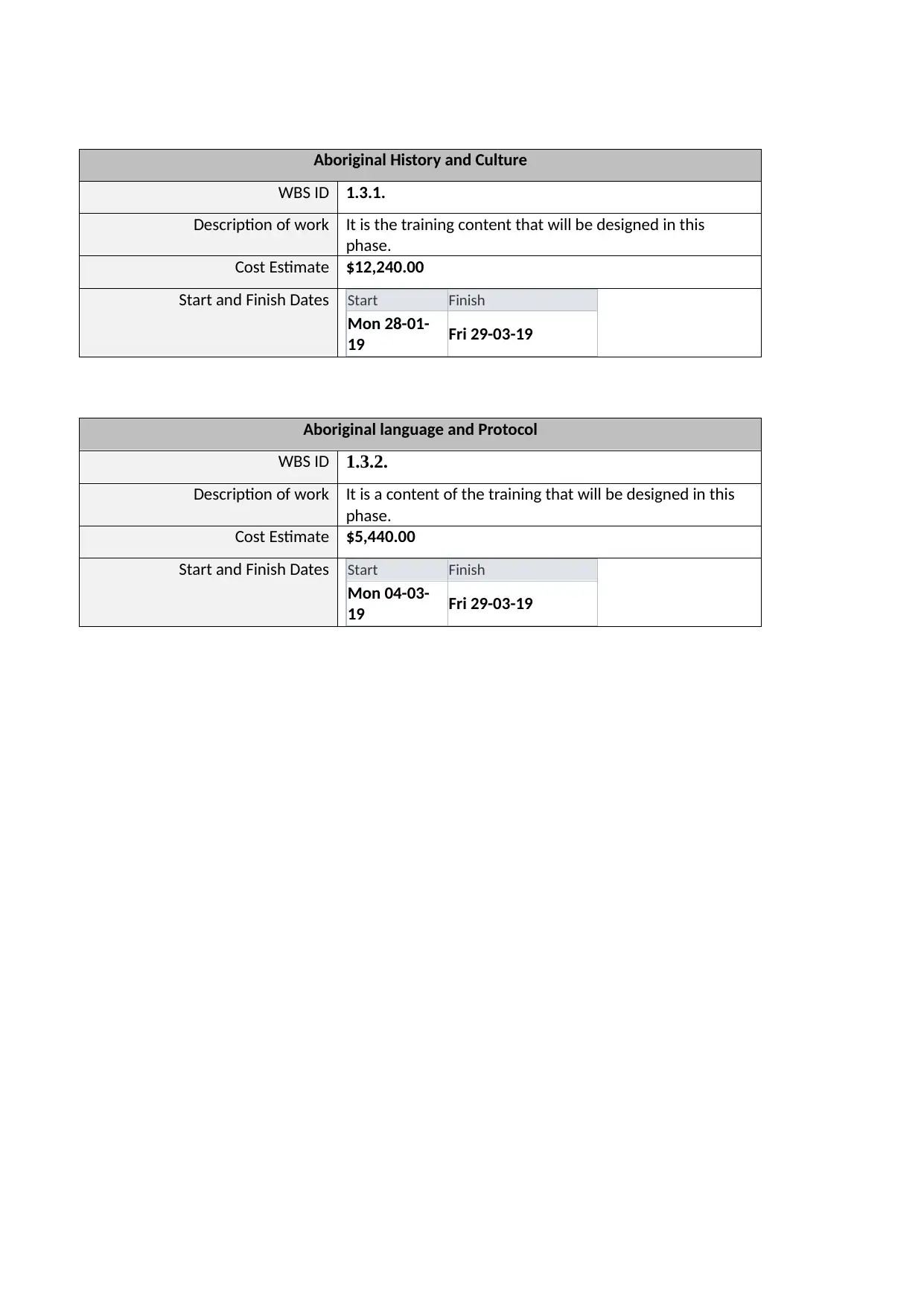
Aboriginal History and Culture
WBS ID 1.3.1.
Description of work It is the training content that will be designed in this
phase.
Cost Estimate $12,240.00
Start and Finish Dates Start Finish
Mon 28-01-
19 Fri 29-03-19
Aboriginal language and Protocol
WBS ID 1.3.2.
Description of work It is a content of the training that will be designed in this
phase.
Cost Estimate $5,440.00
Start and Finish Dates Start Finish
Mon 04-03-
19 Fri 29-03-19
WBS ID 1.3.1.
Description of work It is the training content that will be designed in this
phase.
Cost Estimate $12,240.00
Start and Finish Dates Start Finish
Mon 28-01-
19 Fri 29-03-19
Aboriginal language and Protocol
WBS ID 1.3.2.
Description of work It is a content of the training that will be designed in this
phase.
Cost Estimate $5,440.00
Start and Finish Dates Start Finish
Mon 04-03-
19 Fri 29-03-19
Paraphrase This Document
Need a fresh take? Get an instant paraphrase of this document with our AI Paraphraser
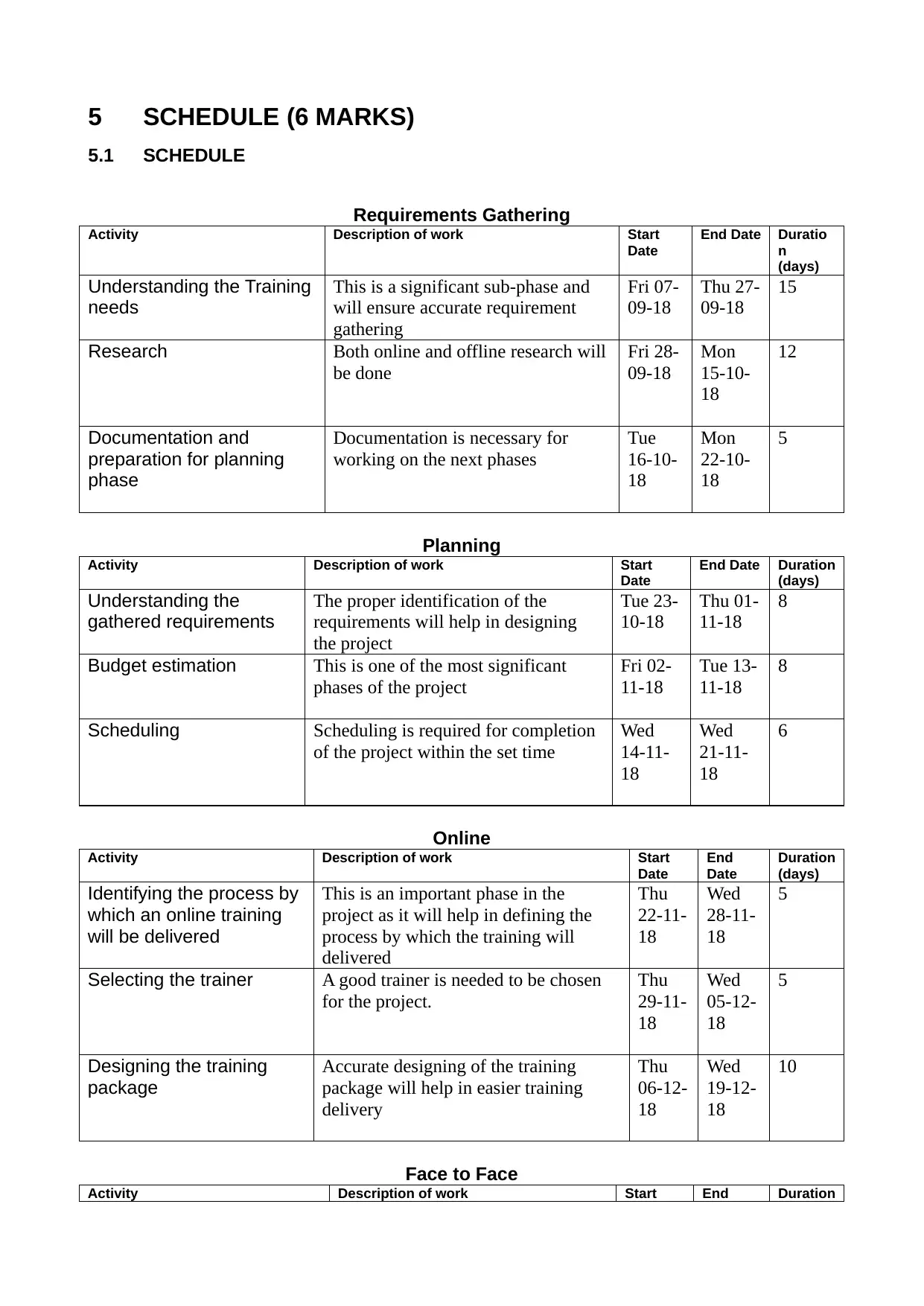
5 SCHEDULE (6 MARKS)
5.1 SCHEDULE
Requirements Gathering
Activity Description of work Start
Date
End Date Duratio
n
(days)
Understanding the Training
needs
This is a significant sub-phase and
will ensure accurate requirement
gathering
Fri 07-
09-18
Thu 27-
09-18
15
Research Both online and offline research will
be done
Fri 28-
09-18
Mon
15-10-
18
12
Documentation and
preparation for planning
phase
Documentation is necessary for
working on the next phases
Tue
16-10-
18
Mon
22-10-
18
5
Planning
Activity Description of work Start
Date
End Date Duration
(days)
Understanding the
gathered requirements
The proper identification of the
requirements will help in designing
the project
Tue 23-
10-18
Thu 01-
11-18
8
Budget estimation This is one of the most significant
phases of the project
Fri 02-
11-18
Tue 13-
11-18
8
Scheduling Scheduling is required for completion
of the project within the set time
Wed
14-11-
18
Wed
21-11-
18
6
Online
Activity Description of work Start
Date
End
Date
Duration
(days)
Identifying the process by
which an online training
will be delivered
This is an important phase in the
project as it will help in defining the
process by which the training will
delivered
Thu
22-11-
18
Wed
28-11-
18
5
Selecting the trainer A good trainer is needed to be chosen
for the project.
Thu
29-11-
18
Wed
05-12-
18
5
Designing the training
package
Accurate designing of the training
package will help in easier training
delivery
Thu
06-12-
18
Wed
19-12-
18
10
Face to Face
Activity Description of work Start End Duration
5.1 SCHEDULE
Requirements Gathering
Activity Description of work Start
Date
End Date Duratio
n
(days)
Understanding the Training
needs
This is a significant sub-phase and
will ensure accurate requirement
gathering
Fri 07-
09-18
Thu 27-
09-18
15
Research Both online and offline research will
be done
Fri 28-
09-18
Mon
15-10-
18
12
Documentation and
preparation for planning
phase
Documentation is necessary for
working on the next phases
Tue
16-10-
18
Mon
22-10-
18
5
Planning
Activity Description of work Start
Date
End Date Duration
(days)
Understanding the
gathered requirements
The proper identification of the
requirements will help in designing
the project
Tue 23-
10-18
Thu 01-
11-18
8
Budget estimation This is one of the most significant
phases of the project
Fri 02-
11-18
Tue 13-
11-18
8
Scheduling Scheduling is required for completion
of the project within the set time
Wed
14-11-
18
Wed
21-11-
18
6
Online
Activity Description of work Start
Date
End
Date
Duration
(days)
Identifying the process by
which an online training
will be delivered
This is an important phase in the
project as it will help in defining the
process by which the training will
delivered
Thu
22-11-
18
Wed
28-11-
18
5
Selecting the trainer A good trainer is needed to be chosen
for the project.
Thu
29-11-
18
Wed
05-12-
18
5
Designing the training
package
Accurate designing of the training
package will help in easier training
delivery
Thu
06-12-
18
Wed
19-12-
18
10
Face to Face
Activity Description of work Start End Duration
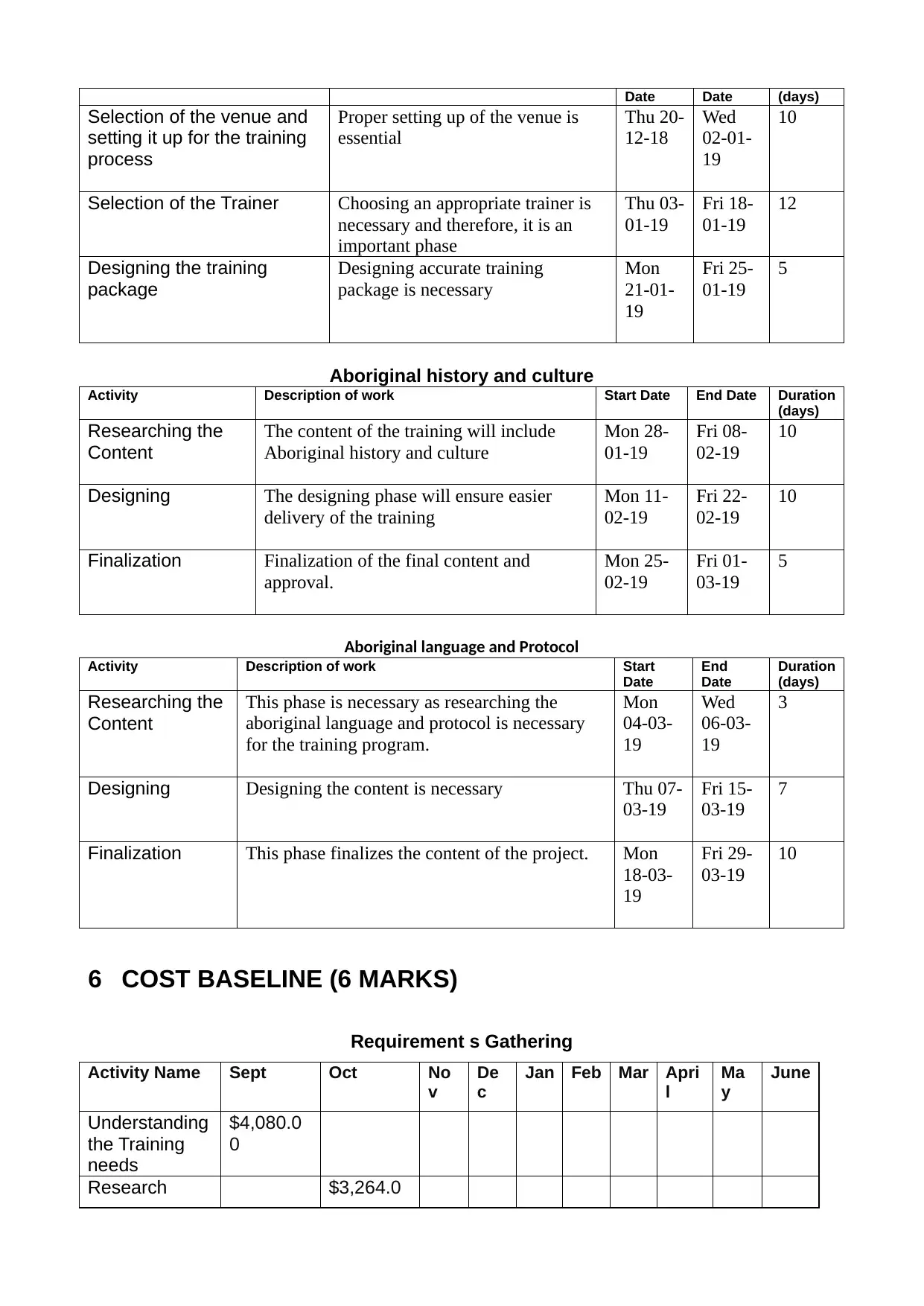
Date Date (days)
Selection of the venue and
setting it up for the training
process
Proper setting up of the venue is
essential
Thu 20-
12-18
Wed
02-01-
19
10
Selection of the Trainer Choosing an appropriate trainer is
necessary and therefore, it is an
important phase
Thu 03-
01-19
Fri 18-
01-19
12
Designing the training
package
Designing accurate training
package is necessary
Mon
21-01-
19
Fri 25-
01-19
5
Aboriginal history and culture
Activity Description of work Start Date End Date Duration
(days)
Researching the
Content
The content of the training will include
Aboriginal history and culture
Mon 28-
01-19
Fri 08-
02-19
10
Designing The designing phase will ensure easier
delivery of the training
Mon 11-
02-19
Fri 22-
02-19
10
Finalization Finalization of the final content and
approval.
Mon 25-
02-19
Fri 01-
03-19
5
Aboriginal language and Protocol
Activity Description of work Start
Date
End
Date
Duration
(days)
Researching the
Content
This phase is necessary as researching the
aboriginal language and protocol is necessary
for the training program.
Mon
04-03-
19
Wed
06-03-
19
3
Designing Designing the content is necessary Thu 07-
03-19
Fri 15-
03-19
7
Finalization This phase finalizes the content of the project. Mon
18-03-
19
Fri 29-
03-19
10
6 COST BASELINE (6 MARKS)
Requirement s Gathering
Activity Name Sept Oct No
v
De
c
Jan Feb Mar Apri
l
Ma
y
June
Understanding
the Training
needs
$4,080.0
0
Research $3,264.0
Selection of the venue and
setting it up for the training
process
Proper setting up of the venue is
essential
Thu 20-
12-18
Wed
02-01-
19
10
Selection of the Trainer Choosing an appropriate trainer is
necessary and therefore, it is an
important phase
Thu 03-
01-19
Fri 18-
01-19
12
Designing the training
package
Designing accurate training
package is necessary
Mon
21-01-
19
Fri 25-
01-19
5
Aboriginal history and culture
Activity Description of work Start Date End Date Duration
(days)
Researching the
Content
The content of the training will include
Aboriginal history and culture
Mon 28-
01-19
Fri 08-
02-19
10
Designing The designing phase will ensure easier
delivery of the training
Mon 11-
02-19
Fri 22-
02-19
10
Finalization Finalization of the final content and
approval.
Mon 25-
02-19
Fri 01-
03-19
5
Aboriginal language and Protocol
Activity Description of work Start
Date
End
Date
Duration
(days)
Researching the
Content
This phase is necessary as researching the
aboriginal language and protocol is necessary
for the training program.
Mon
04-03-
19
Wed
06-03-
19
3
Designing Designing the content is necessary Thu 07-
03-19
Fri 15-
03-19
7
Finalization This phase finalizes the content of the project. Mon
18-03-
19
Fri 29-
03-19
10
6 COST BASELINE (6 MARKS)
Requirement s Gathering
Activity Name Sept Oct No
v
De
c
Jan Feb Mar Apri
l
Ma
y
June
Understanding
the Training
needs
$4,080.0
0
Research $3,264.0
⊘ This is a preview!⊘
Do you want full access?
Subscribe today to unlock all pages.

Trusted by 1+ million students worldwide
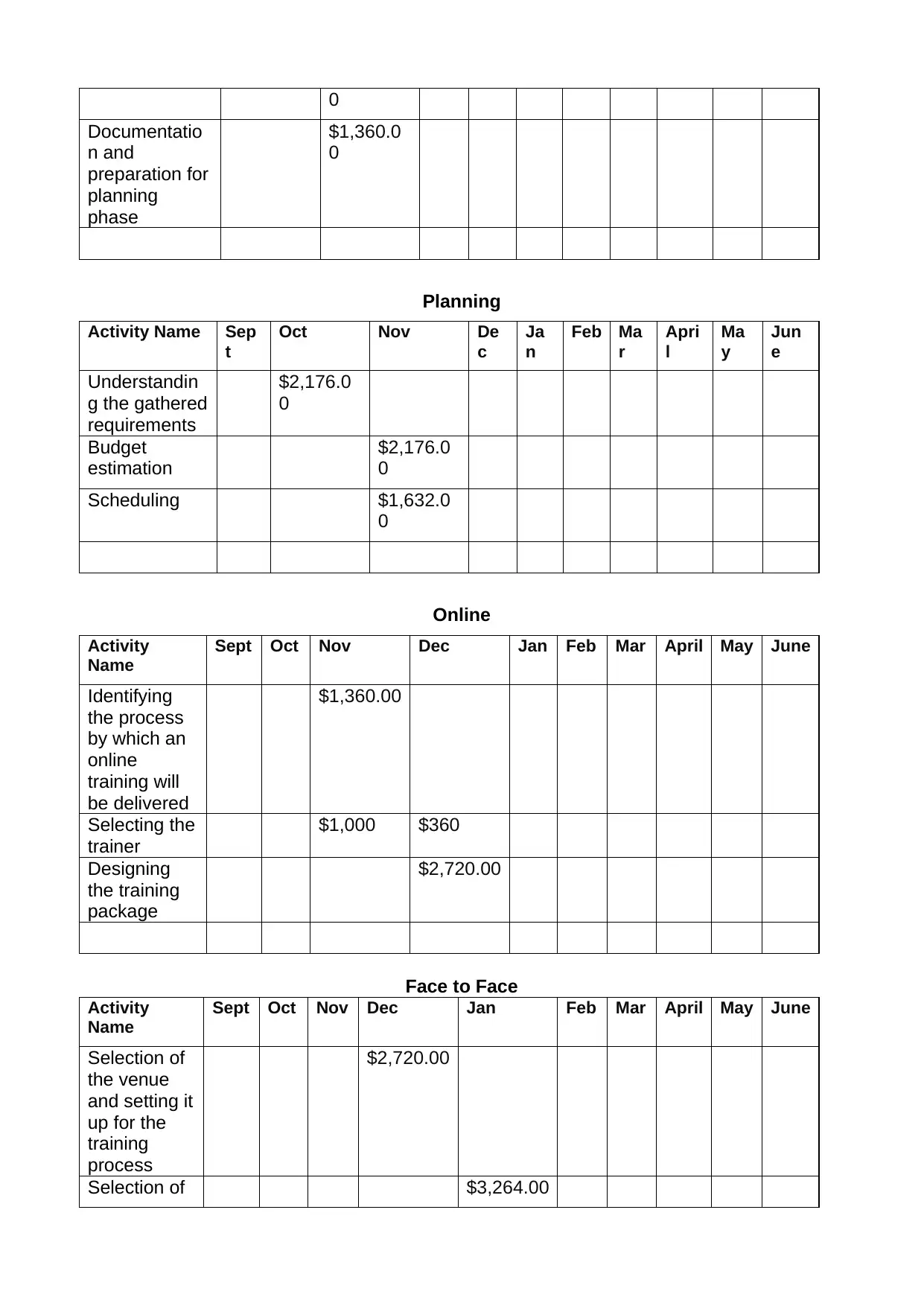
0
Documentatio
n and
preparation for
planning
phase
$1,360.0
0
Planning
Activity Name Sep
t
Oct Nov De
c
Ja
n
Feb Ma
r
Apri
l
Ma
y
Jun
e
Understandin
g the gathered
requirements
$2,176.0
0
Budget
estimation
$2,176.0
0
Scheduling $1,632.0
0
Online
Activity
Name
Sept Oct Nov Dec Jan Feb Mar April May June
Identifying
the process
by which an
online
training will
be delivered
$1,360.00
Selecting the
trainer
$1,000 $360
Designing
the training
package
$2,720.00
Face to Face
Activity
Name
Sept Oct Nov Dec Jan Feb Mar April May June
Selection of
the venue
and setting it
up for the
training
process
$2,720.00
Selection of $3,264.00
Documentatio
n and
preparation for
planning
phase
$1,360.0
0
Planning
Activity Name Sep
t
Oct Nov De
c
Ja
n
Feb Ma
r
Apri
l
Ma
y
Jun
e
Understandin
g the gathered
requirements
$2,176.0
0
Budget
estimation
$2,176.0
0
Scheduling $1,632.0
0
Online
Activity
Name
Sept Oct Nov Dec Jan Feb Mar April May June
Identifying
the process
by which an
online
training will
be delivered
$1,360.00
Selecting the
trainer
$1,000 $360
Designing
the training
package
$2,720.00
Face to Face
Activity
Name
Sept Oct Nov Dec Jan Feb Mar April May June
Selection of
the venue
and setting it
up for the
training
process
$2,720.00
Selection of $3,264.00
Paraphrase This Document
Need a fresh take? Get an instant paraphrase of this document with our AI Paraphraser
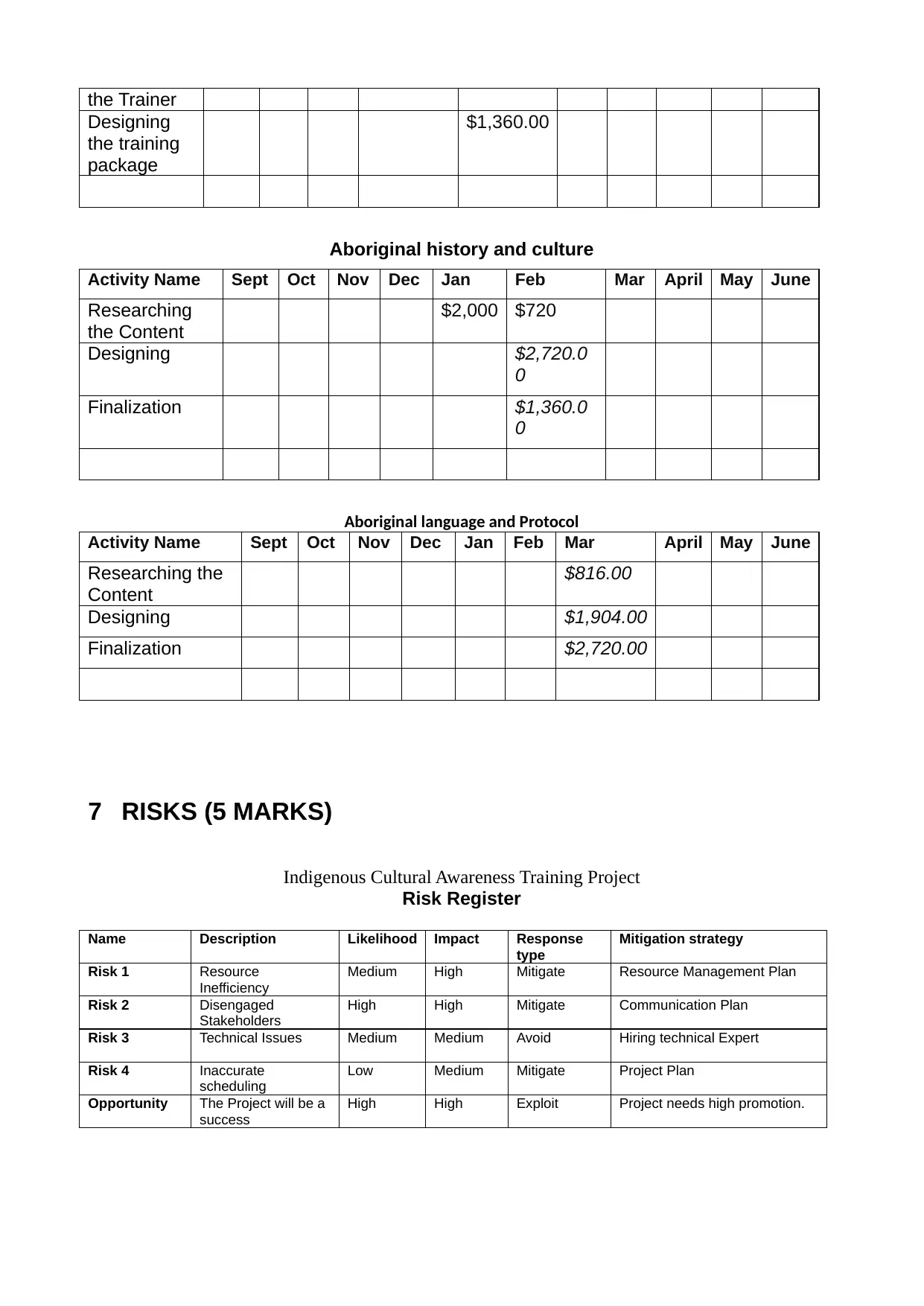
the Trainer
Designing
the training
package
$1,360.00
Aboriginal history and culture
Activity Name Sept Oct Nov Dec Jan Feb Mar April May June
Researching
the Content
$2,000 $720
Designing $2,720.0
0
Finalization $1,360.0
0
Aboriginal language and Protocol
Activity Name Sept Oct Nov Dec Jan Feb Mar April May June
Researching the
Content
$816.00
Designing $1,904.00
Finalization $2,720.00
7 RISKS (5 MARKS)
Indigenous Cultural Awareness Training Project
Risk Register
Name Description Likelihood Impact Response
type
Mitigation strategy
Risk 1 Resource
Inefficiency
Medium High Mitigate Resource Management Plan
Risk 2 Disengaged
Stakeholders
High High Mitigate Communication Plan
Risk 3 Technical Issues Medium Medium Avoid Hiring technical Expert
Risk 4 Inaccurate
scheduling
Low Medium Mitigate Project Plan
Opportunity The Project will be a
success
High High Exploit Project needs high promotion.
Designing
the training
package
$1,360.00
Aboriginal history and culture
Activity Name Sept Oct Nov Dec Jan Feb Mar April May June
Researching
the Content
$2,000 $720
Designing $2,720.0
0
Finalization $1,360.0
0
Aboriginal language and Protocol
Activity Name Sept Oct Nov Dec Jan Feb Mar April May June
Researching the
Content
$816.00
Designing $1,904.00
Finalization $2,720.00
7 RISKS (5 MARKS)
Indigenous Cultural Awareness Training Project
Risk Register
Name Description Likelihood Impact Response
type
Mitigation strategy
Risk 1 Resource
Inefficiency
Medium High Mitigate Resource Management Plan
Risk 2 Disengaged
Stakeholders
High High Mitigate Communication Plan
Risk 3 Technical Issues Medium Medium Avoid Hiring technical Expert
Risk 4 Inaccurate
scheduling
Low Medium Mitigate Project Plan
Opportunity The Project will be a
success
High High Exploit Project needs high promotion.
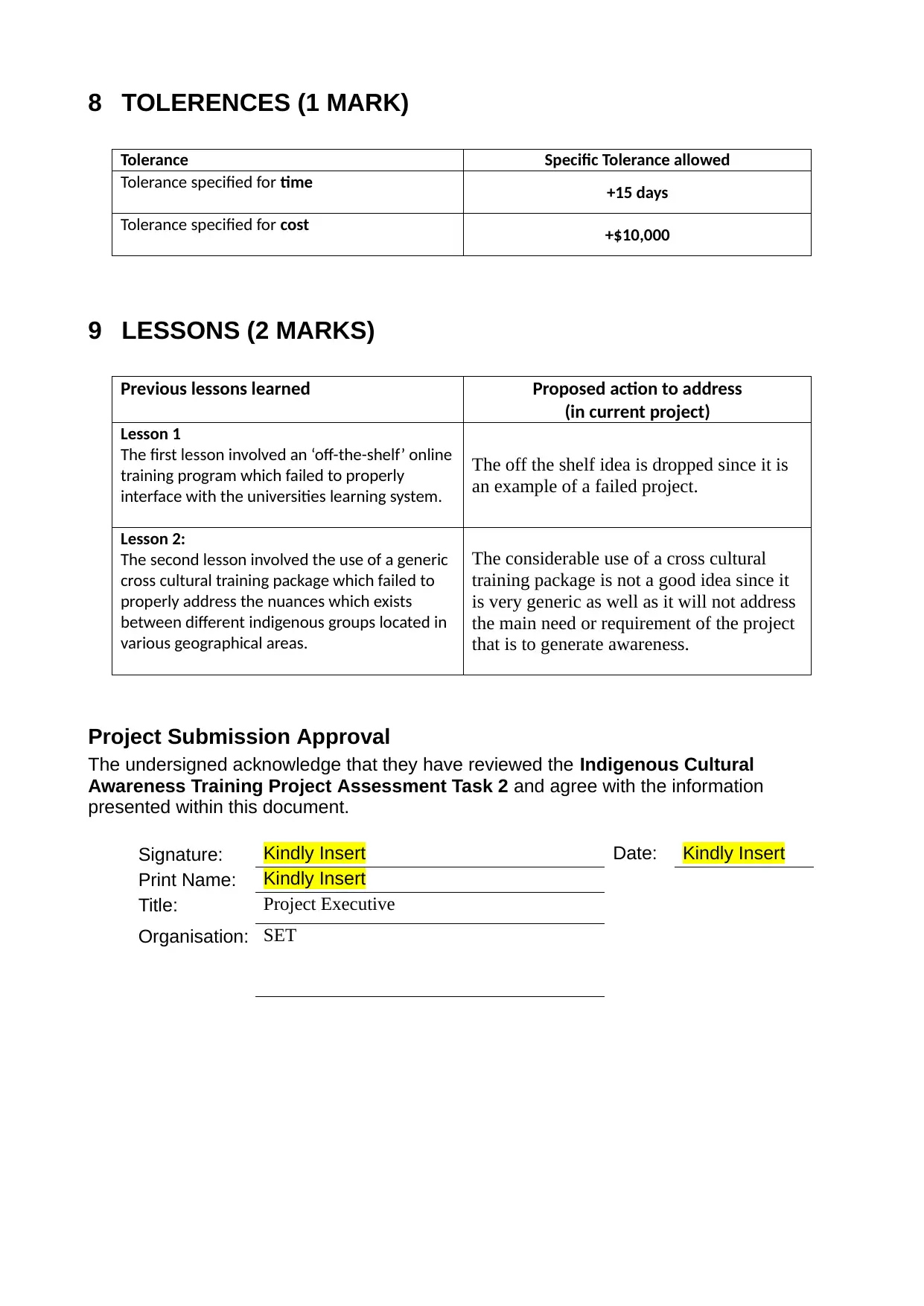
8 TOLERENCES (1 MARK)
Tolerance Specific Tolerance allowed
Tolerance specified for time +15 days
Tolerance specified for cost +$10,000
9 LESSONS (2 MARKS)
Previous lessons learned Proposed action to address
(in current project)
Lesson 1
The first lesson involved an ‘off-the-shelf’ online
training program which failed to properly
interface with the universities learning system.
The off the shelf idea is dropped since it is
an example of a failed project.
Lesson 2:
The second lesson involved the use of a generic
cross cultural training package which failed to
properly address the nuances which exists
between different indigenous groups located in
various geographical areas.
The considerable use of a cross cultural
training package is not a good idea since it
is very generic as well as it will not address
the main need or requirement of the project
that is to generate awareness.
Project Submission Approval
The undersigned acknowledge that they have reviewed the Indigenous Cultural
Awareness Training Project Assessment Task 2 and agree with the information
presented within this document.
Signature: Kindly Insert Date: Kindly Insert
Print Name: Kindly Insert
Title: Project Executive
Organisation: SET
Tolerance Specific Tolerance allowed
Tolerance specified for time +15 days
Tolerance specified for cost +$10,000
9 LESSONS (2 MARKS)
Previous lessons learned Proposed action to address
(in current project)
Lesson 1
The first lesson involved an ‘off-the-shelf’ online
training program which failed to properly
interface with the universities learning system.
The off the shelf idea is dropped since it is
an example of a failed project.
Lesson 2:
The second lesson involved the use of a generic
cross cultural training package which failed to
properly address the nuances which exists
between different indigenous groups located in
various geographical areas.
The considerable use of a cross cultural
training package is not a good idea since it
is very generic as well as it will not address
the main need or requirement of the project
that is to generate awareness.
Project Submission Approval
The undersigned acknowledge that they have reviewed the Indigenous Cultural
Awareness Training Project Assessment Task 2 and agree with the information
presented within this document.
Signature: Kindly Insert Date: Kindly Insert
Print Name: Kindly Insert
Title: Project Executive
Organisation: SET
⊘ This is a preview!⊘
Do you want full access?
Subscribe today to unlock all pages.

Trusted by 1+ million students worldwide
1 out of 13
Related Documents
Your All-in-One AI-Powered Toolkit for Academic Success.
+13062052269
info@desklib.com
Available 24*7 on WhatsApp / Email
![[object Object]](/_next/static/media/star-bottom.7253800d.svg)
Unlock your academic potential
Copyright © 2020–2025 A2Z Services. All Rights Reserved. Developed and managed by ZUCOL.





